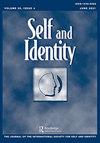自我同情与消极的群体外态度:同情他人的中介作用
IF 2.1
4区 心理学
Q3 PSYCHOLOGY, SOCIAL
引用次数: 1
摘要
摘要自我同情植根于共同的人性、自我善良和正念,是一种适应性的自我概念,可以缓解对自我形象威胁的防御。我们假设,自我同情会缓冲表达负面群体间态度的需要,这种关系可以用对他人的同情来解释。在一项预先注册的研究中,与那些植根于共同人性的自我同情较低的参与者相比,具有更强的植根于共同人类的自我同情,但不具有自我善良或正念的参与者(N=163)对外部群体表达的负面态度较少。此外,这种关系甚至在控制了自尊之后仍然存在,自尊是一种与自我同情相关但不同于自我同情的结构。最后,对他人的同情介导了自我同情与群体间态度之间的关系。这些发现支持了个体层面的自我同情在群体间关系中的积极而独特的作用。本文章由计算机程序翻译,如有差异,请以英文原文为准。
Self-compassion and negative outgroup attitudes: The mediating role of compassion for others
ABSTRACT Self-compassion, rooted in common humanity, self-kindness, and mindfulness, is an adaptive self-concept that assuages defensiveness to self-image threats. We hypothesized that self-compassion would buffer the need to express negative intergroup attitudes and that this relation would be explained by compassion for others. In a preregistered study, participants (N = 163) with stronger self-compassion rooted in common humanity, but not self-kindness or mindfulness, expressed less negative attitudes toward outgroups than those with lower self-compassion rooted in common humanity. Moreover, this relation persisted even after controlling for self-esteem, a construct related to but distinct from self-compassion. Finally, compassion for others mediated the relation between self-compassion and intergroup attitudes. These findings support the positive and unique role of individual-level self-compassion in intergroup relations.
求助全文
通过发布文献求助,成功后即可免费获取论文全文。
去求助
来源期刊

Self and Identity
PSYCHOLOGY, SOCIAL-
CiteScore
5.10
自引率
5.00%
发文量
26
期刊介绍:
Work on self and identity has a special place in the study of human nature, as self-concerns are arguably at the center of individuals" striving for well-being and for making sense of one"s life. Life goals develop and are influenced by one"s view of what one is like, the way one would ideally like to be (or would like to avoid being), as well as one"s perceptions of what is feasible. Furthermore, conceptions of self and the world affect how one"s progress towards these goals is monitored, evaluated, redirected, re-evaluated, and pursued again. Thus, the “self” as a construct has far-reaching implications for behavior, self-esteem, motivation, experience of emotions and the world more broadly, and hence for interpersonal relationships, society, and culture.
 求助内容:
求助内容: 应助结果提醒方式:
应助结果提醒方式:


